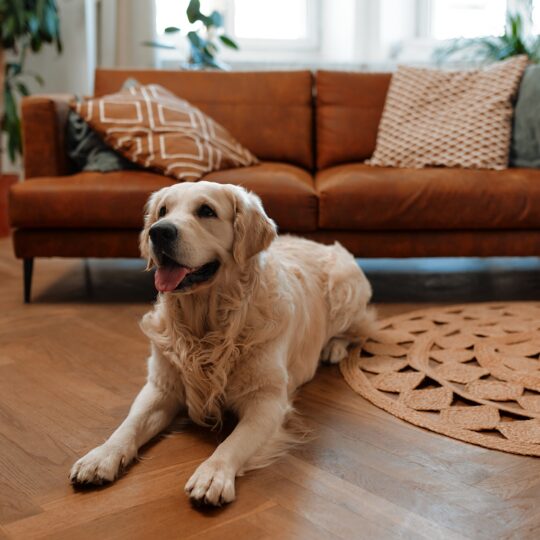Is Putting Flea Medicine on Your Pet Enough to Eliminate Most Fleas?

Many pests come indoors entirely on their own. Spiders, cockroaches, ants – these pests love coming indoors for food, shelter, water, or to feed on other bugs.
Some pests, however, tend to get carried in. Fleas are one of the best examples of this. Although it is possible for fleas to come into your property on their own if you have a lot of fleas outside, most of the time, fleas come in by being carried in the fur of your pets.
For many, this opens the door for an important question: is putting flea medicine on my pet enough to kill all the fleas on my property?
Once flea infestations grow, it’s not uncommon to find dozens of fleas around your home, including on your couch/chair, in your carpet, and anywhere your pets frequent. So, will killing fleas on your dog or cat be enough to eliminate fleas over the rest of your property?
The Process for Eliminating Home Fleas
The answer is, essentially, “maybe.”
It depends a little on the following:
- How severe is the infestation?
- How many pets are on the property?
- How long has your pet had fleas?
- How consistent will you be with flea medication?
Adult fleas can only live for a few days without a host. Larvae can live longer, up to 45 days. However, after the larva stage, fleas go into hibernation, and can hatch as many as 100 days later.
What this means is that treating your pet for fleas might be enough to kill all fleas on your property if the infestation is small. You might be able to vacuum up a few eggs and maybe, if some fleas do hatch, they’ll also die when they feed on your pet again while your pet still has flea medication in it system.
Still, for others, that may not be enough. Treating your pet with flea medicine is an important first step, but for those with a more significant infestation, it won’t be enough to fully resolve a flea problem once they’ve established themselves in your home. Flea medications are designed to kill the fleas that bite your pet, but they do not address fleas or flea eggs in your carpet, bedding, or furniture. Since fleas reproduce quickly, the environment itself usually has to be treated as well.
Adult fleas represent only a small portion of the population. The majority exist as eggs, larvae, or pupae in the environment. These life stages are not always affected by the treatments you apply to your pet, which means new fleas can continue to emerge even after your dog or cat has been medicated.
Why Flea Medicine Alone Often Falls Short
There are several reasons why homeowners typically need to do more than medicate their pets:
- Flea Eggs and Larvae – Flea eggs fall off pets and embed in carpets, upholstery, and pet bedding. Larvae develop hidden in fibers and cracks where they are protected from direct treatment.
- Pupae Stage – Fleas in the pupal stage are resistant to most chemicals and can survive for weeks, waiting to emerge when they sense movement or warmth. That is a bit different from other pests that emerge after a specific amount of time.
- Household Spread – Once established, fleas can be found in multiple areas of the home, especially in rooms where pets sleep or spend a lot of time.
- Outdoor Sources – If your pet got its fleas from your yard, there is significant risk that will happen again without help. Pets can pick up fleas again if they spend time outdoors, especially in areas with tall grass, wildlife, or untreated soil.
This means that while flea medication keeps your pet protected, it will not stop fleas from developing and multiplying in the environment around them.
What Most Homeowners Really Need to Do
For most homeowners, fully eliminating fleas requires a combination of approaches:
- Continue using veterinarian-recommended flea treatments for pets.
- Wash pet bedding and blankets frequently in hot water.
- Vacuum carpets, rugs, and upholstered furniture on a regular basis, disposing of vacuum bags immediately.
- Treat the home and, if needed, the yard with flea control products designed to target multiple life stages.
- In cases of heavy infestations, professional pest control is necessary to break the flea life cycle indoors.
The honest answer is that flea medicine on your pet is helpful, but it is often not enough on its own. Fleas are persistent and reproduce quickly, which makes environmental treatment just as important as protecting your pet. Most homeowners will only get lasting results by combining pet care with consistent cleaning and targeted treatments for the home itself.
If you have had a problem with fleas on your property, reach out to ExtermPRO, today.
Special Offer for New Customers
$50 Off Complete Pest Control Services
Hurry! Offer Expires February 15, 2026